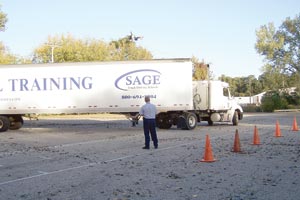Changed Rules Causing Delays in Commercial Truck Driver Licensing in Pennsylvania

New licensing requirements for commercial truck drivers that begin Dec. 21 in Pennsylvania are causing the state to close more than 25% of its testing centers and creating long waiting periods for applicants to take their test at the ones that remain.
The Federal Motor Carrier Safety Administration overhauled federal regulations for commercial truck drivers in July 2011 to require applicants to pass a more extensive road test and provide better proof of identity and residency. States usually have three years to implement new rules, but federal officials added a year to give states more time to comply.
Pennsylvania has been providing more extensive road tests since June, but the other changes don’t take effect until Dec. 21, more than five months late. That’s because the Legislature didn’t pass the required amendments to the state motor vehicle code until October.
The biggest issue is the more extensive road test applicants must take, said Kevin Stewart, director of safety for the Pennsylvania Motor Truck Association. It takes more time — two hours instead of one — and requires a bigger physical space, a double whammy because the longer test comes at a time when the state has fewer testing facilities.
Pennsylvania, following a trend of other states, had to close 12 of its 40 commercial license road test sites because they didn’t have enough space to conduct the revamped test.
“It’s a concern because schools and companies get their new drivers ready and they pass the written test, then the delays can be weeks before the road test can be scheduled,” Stewart said.
He added that one company in the southeast part of the state sent its new drivers to a testing center in Johnstown, several hours away, to avoid a six-week delay in scheduling road tests.
Craig A. Yetter, PennDOT’s press officer for Driver and Vehicle Services, acknowledged the long wait in an e-mail response to questions. The state is encouraging applicants to take road tests at third-party providers such as training schools and lobbying for more private sites to obtain certification so they can offer the test.
“Wait times vary from site to site, and there are a number of locations that do have a six-week wait for tests,” he said. “Commercial learning permit holders always have the option of visiting a third-party tester to take their skills test. The wait times at the various third-party testing locations are much lower.”
The new test includes the same on-road skills test but added two sections. One is a more extensive visual vehicle inspection that requires a driver to identify up to 128 components on the vehicle and know what to look for to make sure the vehicle is safe to operate. The other is basic vehicle control maneuvers that include backing up in an adjacent lane and at a sharp angle, as well as parallel parking.
One additional requirement that is causing problems for some driver training schools — especially those near state borders — is known as the “domicile rule,” said Sean Garney, director of safety policy for American Trucking Associations. That requires license applicants to take the written test in their home state, regardless of where they are training, sometimes causing them not to return to the training center, he said.
In addition to the testing changes, every new driver, everyone renewing a license and everyone making a change in a license classification has to make one personal visit to any of the state’s 70 license centers to verify identity and residency. Those requirements were established after lobbying from the federal Office of Homeland Security due to concerns about the possibility of terrorists using trucks for attacks, but renewals can be made online thereafter.
Pennsylvania has 400,000 people who hold commercial driver licenses, which have to be renewed every four years.
Stewart said the changes come at a time when there is a shortage of qualified drivers, and companies are scrambling to find more, including establishing their own training programs. The delays in testing exacerbate that problem, but the changes are positive, he said.
“We support the changes in the testing procedure,” Stewart said. “It’s certainly made it more difficult to become a commercial truck driver, and that’s a good thing.”



